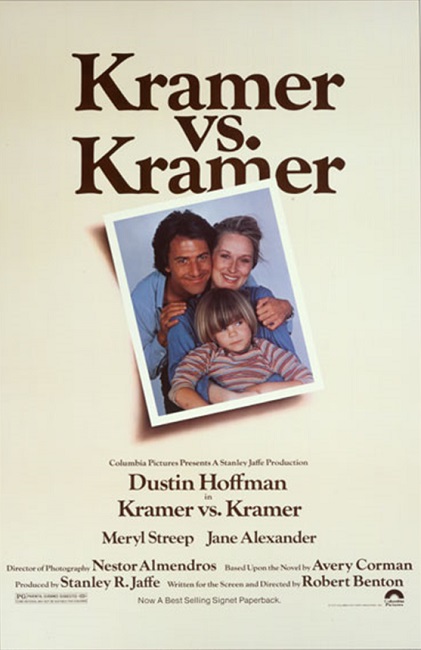
Kramer vs. Kramer – 1979
Kramer vs. Kramer is a drama about divorce. It looks at the subject from different points of view. We see it through the eyes of Ted Kramer, played by Dustin Hoffman, who we remember from his performance in Midnight Cowboy. We examine it through the mind of Joanna Kramer, played by Meryl Streep, who we just saw in The Deer Hunter. And we experience it through their troubled child Billy Kramer, played by child actor Justin Henry. Most of the film focused on the effects of the divorce upon the father and the child after the mother leaves. But in the latter half of the movie, the mother returns and tries to take her son back. The movie then concentrates on the following custody battle.
The drama was good. I liked it because it was not preachy, it did not take sides, it didn’t go out of its way to use the kid as a cute factor. The movie just wanted to tell a good story, which it did very well. I wouldn’t call it powerful but it had several powerful moments. Even the actors didn’t expect the social and cultural impact of the film. The subject matter was very topical and relevant for the time it was released.
This was the end of the 1970s. Women were still struggling to find their independence from a male dominated world. The whole movie opens with Joanna doing something that was considered unthinkable. She was leaving her child to get away from her husband. Her behavior is that of a woman who is not emotionally or possibly even mentally stable. She is so frantic to get away from him that when he tries to stop her from walking out by taking her suitcase, she chooses to leave it behind rather than staying to retrieve it. She is in tears, blaming herself for her behavior.
Once she is gone, Ted is forced to deal not only with the stress of a dissolving marriage and his high pressure job, which was indirectly responsible for the divorce, but now he must take on the role of sole care-taker of his six-year-old child. He does his best and rises to the occasion. True, he makes mistakes, his career suffers, and his child is hurt and damages by the loss of his mother, but Ted and Billy overcome these obstacles. The go through the pain and hardship of the troubled situation together. Through it, Ted becomes a better man and develops a very close relationship with his son.
The writing was very realistic. The changes in the characters were gradual – just like in the real world. And not everything was perfect. Ted made mistakes, and Billy was, at times, a difficult and troubled child who acted out in pain and anger. But together, they learned how to survive and grow. It was especially nice to see the father and son grow so close, which made what happened next all the more upsetting.
Joanna showed up again, saying she wanted her son back. My reaction was very negative. After all, she was the one who left. She was the one who hurt but Ted and Billy. She made her bed, and I thought that she deserved to lie in it. But I’ll be darned if Meryl Streep isn’t a good enough actress to make me see Joanna’s side of the argument. She made me actually doubt my initial opinion of her character and sympathize with her. Her heart-felt testimony in court was delivered perfectly. Once again, Streep was wonderful to watch.
Interesting note: Kate Jackson was originally the front runner to play the role of Joanna, but she could not get the time away from her television schedule on Charlie’s Angels. Streep was originally cast as another supporting role, but was given the part of Joanna when Jackson turned it down.
The real turning point in the plot was the court battle for custody of Billy. Joanna made a very convincing case as to why she left her husband and child in the first case. Streep has the ability to cry on cue, and we all know how effective a woman’s tears can be. She was incredible.
But I still sided with Ted. He was the one who had been wronged, at least more than his wife. He was the one who had to pick up the pieces of the mess she’d made. And when it came to his son, he really stepped up to the plate and went out of his way to take care of his responsibilities. While he may have largely been the reason for Joanna’s departure, she seemed to me to be emotionally unstable and flighty.
Hoffman, as an actor, was doing what he usually does. He was playing himself. To be honest, I’ve just always seen him as an actor with a fairly limited emotional range. He has calm, distressed, and angry, and that’s about it. But I have to admit, he almost broke that mold several times in this movie. Several times, he allowed his voice to crack ever so slightly and I could tell that he was getting choked up with emotion. But he never actually showed any tears.
So what am I saying? I’m saying that Hoffman did a good job, though no better or worse than anyone else would have done. I thought he gave a better performance in Midnight Cowboy. But the Academy didn’t agree with my assessment. Hoffman won the Academy Award for Best Actor for his performance.
Justin Henry did a very good job for a child actor. Most child actors, I imagine, get into the business because their parents think that their children are cuter than any others out there. Those kids learn very early on that they are treated special because they are cute. So they go out of their way to be cute in their behavior, their appearance, their attitude. And that is what makes them horrible actors. Henry did not try to be cute. His performance was real and believable, which is rare for anyone that young.
Interesting note: Justin had several scenes in which he had to cry. In order to help him along, Hoffman asked him, “Do you like being here on the set, making new friends?” Apparently he liked it very much. Hoffman then said, “You know when we are done filming, you probably won’t ever see them again.” That got the tears going. And what was worse was that Hoffman thought he was very clever for doing it, proudly telling this story in an interview. What a jerk! Badly played Hoffman!!
The supporting cast all did a fine job as well. Special notice has to be given to two women. First was Jane Alexander who played the part of Margaret Phepls, Joanna and Ted’s close friend. She was a pleasure to watch. She was an expert at delivering her lines and making them seem natural, not forced. She seemed like someone we would all love to know. She was also very pretty, which didn’t hurt. I liked watching her. She was particularly good in the courtroom scene, where she tries to speak in Ted’s favor without lying to the judge.
Second, in a very small but… ahem… memorable role, was JoBeth Williams, playing the part of Phyllis, Ted’s one night stand. The morning after, she gets out of bed completely naked, and I mean COMPLETELY naked. She goes out in to hall to get to the bathroom and meets Billy in the hallway. She tries to cover herself as much as possible while Billy tries to have a conversation with her, asking her if she likes fried chicken. Ted can hear the conversation from the bedroom and is mortified.
JoBeth Williams just happens to be the lead actress in one of my favorite movies, 1982’s Poltergeist. So I have a bit of a soft spot in my heart for her. But watch out for the gigantic 70s/80s style glasses they make her wear that covered half her face. That kind of eye-wear never looked good on anyone.
Interesting note: I caught a tiny editing error in the first scene JoBeth is in. As she looks at some papers, she is smoking a cigarette. She is shot from the side and the cigarette is clearly visible. But when they cut to a front shot, the cigarette has mysteriously vanished.
Kramer vs. Kramer was really a good film. It was nominated for nine Academy Awards and won five of them. In addition to Best Picture, it won Best Director (Robert Benton), Best Actor (Hoffman), Best Supporting Actress (Streep), and Best Adapted Screenplay (Robert Benton). Jane Alexander was nominated for Best Supporting Actress, losing it to Streep.
It was not a film on a large scale. It wasn’t trying to be an Academy Award winner. It never tried to be anything more than what it was: A dramatic story that spoke to the times in which it was made. But maybe that is what made people stop and take notice. The film made a point of looking at the issue of divorce from both the man and the woman’s point of view, and I think that honesty is what made it good story telling, a worthy addition to the list of Best Picture winners.








